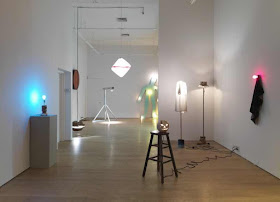
(Eden Eden, Isabella Bortolozzi)
Son, see this is an example of... it's like, you know how we're at those estate sales, or perhaps the awful Ikea your Grandmother enjoys taking you to that you seem to enjoy despite your father's preemptive educationals against incognizance. The one's when we're there you ask me what some strange item that your still fresh mind cannot categorize yet has still somehow aesthetically enchanted your young eye? See these are, in a sense, like that. But instead of your father being there to answer that the object in question is a designed-to-look-designed apple corer made by hands your age, or a mediocre lithograph, or a sextant, imagine instead... The ones where we look for chairs like the ones depicted in the glossy and shadow-less reproductions on unnecessarily heavy bond that woman that your father works keeps on that insipid glass table which book she scolded you for touching? Yes, Son, Eeemes, E. Long E. No, Son, no. That will be the day. Your father just repairs and resells the chairs. Son. No son, don't say that. Son, Eames chairs are representations of the bourgoi- The last nail in the coffin of craft towards the industrialization of representation supplanting the - Look the art - Son you know your father has always preferred the unauthoritative use of Quaker- We're middle cla- Look this is all beside the point. ... No, educated poor, son, we're not poor. Look happiness is- Son. Son the art. Take a step back and look at the art. It posits a godless world son. Imagine a world where the question cannot be answered of what the thing is. Son, imagine a world where no can tell you what something is, no benevolent over-watch granting the bedwarm comfort of knowing, son. No son. Yes, they do look like something familiar don't they. This is the comfort of everything prefixed with the word "Pop-" Pop-music, pop-culture, pop-art. It's about comfort. These, they seem innocuous, but they illustrate the possibility of horror, of the cold arid land pre-rational humans, pre-language, pre-comfort. You see the more categories the artist can position the object between, the more confusing what the object is, the more successful. The object will exist at the tip of the tongue. It will inhabit its representation, but it will not be it. It will replace what looks like comfort with something cold. Yes it might look "neat" son, the in-technical word you chose, it may describe its familiar and affable surface that it uses, but this is just the shell that your still young mind places around it to justify, to hold back the cold dark thing of uncertainty that it wishes to place deep inside you, because it's not that.





























